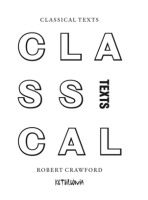
Kettillonia (2021) p/b 48pp £8.00 (ISBN 9781902944364)
This entertaining mini-collection from one of Scotland’s leading contemporary poets and literary critics makes a delightful gift for classicists. Robert Crawford has engaged with classical literature in his work regularly (e.g. in his 2011 Simonides, with splendid photos by Norman McBeath), as well as serving as President of the Classical Association, and this volume offers a brilliant tribute to a series of literary, mythological and historical figures and ideas from the ancient world by means of micro-poems using only their names, beautifully set out in elegant black serif capitals against a grey-scale background.
These works, as the author notes, thus belong to the tradition of ‘concrete poetry’, found in the modern Scottish work of Edwin Morgan and Ian Hamilton Finlay, in which typographical form makes the key contribution to meaning, which itself has roots in the figure poems of Hellenistic Greece by which the poem’s actual shape suggests its subject (as well as a history in English poetry going back at least to George Herbert).
The volume’s blurb suggests that this format marries ancient figures and stories with that most modern form of compressed communication, the text message, and in that sense what we have here is a miniaturised body of classical learning for our own age. Horace’s famous analogy of poetry and graphic depiction from the Ars Poetica (ut pictura poesis, ‘A poem is like a picture’), fittingly forms the epigraph of the collection, and these depicted names are indeed mini-poems, with particular attitudes and perspectives on the figures wittily expressed through clever layout in a form of riddle which classical readers will much enjoy.
A few examples, without spoiling too many of the pleasures of unravelling these mini-puzzles. The arrangement of Sisyphus’ name represents his perpetual rolling up of his rock and its perpetual subsequent descent, that of Sisyphus a consummation which is always out of reach; that of the Cyclops uses the letter I to express his monocularity, that of Socrates reflects his perpetual questioning of conventional values, that of Pythagoras his interest in equilateral triangles, that of Maecenas his worldly riches, that of Hercules his hypermasculinity, that of Venus her sensuality.
These rebus-style puns are ideal for enthusiasts for classical stories and myths, and some at least can be appreciated by readers of all ages; one or two are still testing this reader, but many can be used to communicate key ideas about ancient myth to new enthusiasts. A must for winter evenings.
Stephen Harrison

